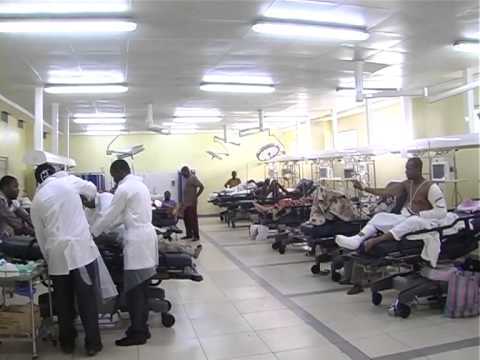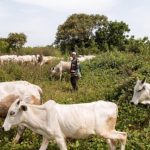
Tuberculosis (TB) experts have urged government at all levels to significantly increase domestic funding of the fight against the disease.
They gave the advice on Monday in Abuja at a press conference to commemorate the World TB Day.
The World TB Day is celebrated on March 24 every year to raise awareness on TB as well as reflect on the progress in the fight against the disease.
The event in Abuja was also used to launch a document on the road map to translate the United Nations’ High-Level Meeting Commitments into Action.
The document outlines how the country intends to achieve the “End TB” pledge made by President Muhammadu Buhari at the United Nations High-level meeting in New York last year.
Speaking at the event, the Minister of Health, Isaac Adewole, said the Federal Ministry of Health in collaboration with its partners will not relent in their fight against the disease and reducing its burden.
The minister, represented by Felix Ogenyi, Director General Services, said most of the people most affected by the burden of the disease are Nigerians aged 15- 44 years. He said this invariably affects the economy.
Highlighting the progress made in fighting the disease, Mr Adewole said the government has established a national Domestic Resource Mobilisation Committee to assist in mobilising more resources for TB Control.
He said the government has been expanding TB services under the Directly Observed Therapy (DOTS) across the country. This, he said, is being extended to the private health facilities.
“We were able to increase the number of health facilities providing free treatment services by 30 per cent within one year from 7,389 in 2017 to 9,625 in 2018. Our target within the next few years is to scale up TB services to all health facilities within the package for Universal Health Coverage, ” he said.
He said the government has also procured more Genexpert machines, increasing the number from 32 in 2012 to 397 in 2018. He said the machines were also donated to the private sector.
“Our national TB treatment coverage, which is one of the indicators used in monitoring progress in UHC on the sustainable development goals for 2018, was 25 per cent. This implies that out of the estimated 418,000 new Tb cases, only 106,533 TB cases were notified in 2018, leaving over 300,000 cases undiagnosed.”
He also said access to the Genexpert machine has been a challenge because of the limited number in the country.
TB is a major public health problem in Nigeria. According to the 2018 World Health Organisation (WHO) Global TB Report, Nigeria is ranked first in Africa and sixth globally among countries with the highest burden of TB.
In addition, Nigeria is among the 30 high TB burden countries and also among the 14 countries on all the three WHO lists of high burden countries for TB, MDR-TB and TB/HIV.
Suvanand Sahu, Deputy Executive Director, Stop TB Partnership Secretariat, Geneva, also said Nigeria needs to increase its funding in the area seven folds in order to record significant progress.
He said the TB challenge in Nigeria is daunting because the incidence of the disease in the country, according to WHO, is not declining and there is a need for that to change.
“The good thing is that the government is taking it seriously. Let us not do things the way we used to do in the past. We need to do things differently so that every Nigerian can have a good quality diagnosis, treatment and care.
“Funding needs to be available. Government from the federal and states need to increase the funding for TB. It is time to unite and deliver on the pledges made to the world and Nigerians,” he said.
Also speaking at the event, Mr Ayodele Awe, a TB expert with WHO, said Nigeria has been appearing on the countries that are not making progress in TB control.
“We do not have enough machines to diagnose the disease. Genexpert was introduced to the country in 2014 and we have less than 400 machines. We have only 40 per cent to cover the country. The government should procure more Genexpert machine for all the 774 local government. A machine cost € 200,000 (N81, 440,770.50). The government can buy more,” he said.
Oladapo Ladipo, the president/CEO, Association for Reproductive and Family Health (ARFH), said TB and its twin brother HIV, are major public health concerns. He said the government should find alternative means to generate funds for TB.
He suggested a tax on luxury goods, a 20 per cent tax on foreign trip tickets and one Naira per GSM call as alternative means for the government to generate funding for TB.
He said another problem slowing down case finding for TB is the low awareness among the people.
“Most people do not know about the disease, we have been talking to ourselves for so long. In order to stop TB in Nigeria, we must evangelise TB. That is going to every nooks and cranny of the country. Nigeria is not like Seychelles or Gambia, it is larges with 36 states and FCT. We need to involve our religious leaders, traditional leaders, media among others,” he said.
You may be interested

PSG To Reignite Interest In Osimhen
Webby - December 21, 2024Paris Saint-Germain have contacted Napoli to discuss signing Victor Osimhen in January, according to reports in France.It is reported that…

Arteta Provides Injury Updates On Five Arsenal Players Ahead Palace Clash
Webby - December 20, 2024Arsenal manager Mikel Arteta has revealed that Declan Rice and Riccardo Calafiori are both available to be in the Gunners…

Carabao Cup: Spurs Edge Man United In Seven-Goal Thriller To Reach Semi-finals
Webby - December 19, 2024Tottenham Hotspur edged Manchester United 4-3 in the quarter-finals of the Carabao Cup on Thursday.Spurs raced to a 3-0 lead…
















![American Pastor, David Wilson Seen Eating The Box Of Woman Who Isn’t His Wife [Video]](https://onlinenigeria.com/wp-content/uploads/2019/10/american-pastor-david-wilson-seen-eating-the-box-of-woman-who-isnt-his-wife-video-150x150.jpg)








